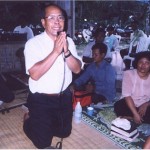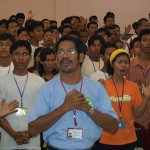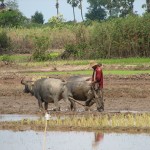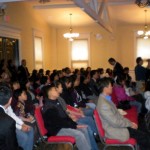September 15, 2009
Wearing A Helmet
At dawn the broad boulevard toward the airport is the only road in Phnom Penh that seems fit for driving, since the other city streets are as bumpy and potholed as the country lanes. Battered bicycles balance bamboo containers brimming with date sugar palm juice, and tired Japanese motor scooters weave among the gleaming white Toyota Land Cruisers marked “OI” for Organization International, and the Mercedes sedans bearing the Cambodian flag on their number plates.
The road looked smooth that morning, so everyone sped along. I glanced at my watch—seven fifty-five. “Oh! I’m already late for work!” I murmured. So I cranked up the speed my white Honda 125—formerly owned by UNTAC. My shirt flapped furiously in the breeze. A glance at my speedometer told me I was doing 80 km/h. I overtook a white Toyota Land Cruiser and a red Honda Dream II 100, and then at the road junction I saw a truck hauling a rusty water tank. While it was crossing the road it seemed like it was going to slip back, so I tried to speed up to pass the truck carrying it’s unsafe cargo, and then—***CRASH***!!!
Two steel machines slammed together. Now on the pavement lay two motorbikes—my white Honda 125 and a black Honda CD 90.
I smelled something burning and tried to get up, but could not because one of my legs was stuck in the wheel of the other motorbike. I pulled up my visor to see what was burning. Through a hole in my trousers leg I spied two white patches on my calf that were gradually turning red, and felt pain at the same time.
Again I tried to get up by pushing my hand against one part of the black motorbike. Unfortunately I chose the wrong part—the exhaust pipe. “OUCH!” I cried. A nearby policeman came and helped me to out of the tangled mess of twisted metal.
The owner of the other motorbike was a man in his thirties wearing an army uniform. He was uninjured. He asked the policeman to measure the accident site to determine who was right and who was wrong, so we could know who would have to pay whom–we can’t afford insurance in Cambodia. By then the officer told me to walk to the roadside where some other policeman were standing so I limped in pain to roadside. It was difficult to balance because one leg hurt so badly, so I dragged myself to where he instructed me to go. I was sweating profusely from the pain.
I inspected my motorbike for damage in order to distract my mind from the pain. The hand clutch was twisted and the fuel tank pretty scratched up. The other man also inspected his bike. “It was borrowed,” he said. “It is not mine.” His headlight was scratched very badly.
One policeman said, “You two must try to come to an agreement. But if you cannot, I will help determine which of you is right and which is wrong. But first try to compromise between the two of you.” He turned to me. “Where were you coming from?” he asked.
“I was riding on the main road from home to work,” I answered.
He turned to the other man. He said he was riding from his house in red light district toward his office near Sihanouk Hospital. Because of the truck we could not see each other therefore collided.
The man kept nagging, “It was borrowed.” I grew annoyed because it was already late for work and my wound still throbbed. “Do you want me to pay for the damage of your motorbike?” I asked. He said nothing. I mustered all my courage and asked the policeman, “Do I need to pay him or does he need to pay me?”
The officer replied, “Do you want me to tell you which one has to pay according to the traffic laws?”
Then the other man said, “Let’s just go. I don’t want anyone to pay.” Then I said good-bye to the policeman.
Around 8:30 a.m. I arrived at YWAM office where I worked. “What happened to your trouser leg?” inquired Marcia, a Filipino who stayed in YWAM office for language study before starting work in the province. I replied with a little chuckle, “Oh, this morning I nearly went to heaven before you!” She smiled, went upstairs to retrieve her personal medical kit, and dressed my leg. “Be careful when you are riding on your motorbike!” she scolded.
“I’ll be careful, but even if I am it doesn’t make any difference,” I protested.
How many people feel the same as I do?
One of the most fascinating aspects of Phnom Penh is the traffic. Accidents are just waiting to happen. We are never sure when we will get into one, and how serious or painful it will be when we do. Do we need somebody help us in those circumstances? Yes, we certainly do! In my accident, had I not been wearing a helmet I might have seriously injured my head. And if a policeman had not helped me get up I might not have been able to, because my leg was caught in a wheel. Even my former boss at World Vision said that if his son Nathan had been wearing a helmet he would not have sustained such seriously head injuries so that he had to fly to Bangkok for surgery. You see the importance of a helmet! We need helmets! Marcia’s instructions; “Be careful!” and the traffic laws were not enough. I needed a person to help me get up. How many people, I wonder, feel caught in the middle of a problem, just as I was caught in that wheel?
After Marcia dressed my wound I switched my worrying to my trousers. I only owned two pairs of trousers, but now one pair was destroyed by the accident. I was a new returnee from Site 2 refugee camp in Thailand, so finances were slim. “They cannot be mended,” I murmured to myself.
The next day I came to work as usual. On my desk lay a new pair of trousers! The day of my accident my YWAM boss, Philip returned from Stung Treng and bought me a new pair. I was very happy that I could have two pairs of trousers.
Do you know of someone who is always waiting to help you? He is not only concerned with your spiritual needs, but your physical needs as well. He is our provider and good policeman who can pull you out of the snares of this sinful world. His name is Jesus!
Let me tell you another story. Sin reminds me of a car stuck in the mud. One evening I went on errands in Boeung Tompon where my aunt lives. In front of the Tumnop Tek Church runs a small dirt road. Rain had fallen the day before. People often shovel dirt on top of the mud to try to fix a road after such rains. The road then looks good, but underneath there is no traction and is treacherous. When I saw this newly-“repaired” road, I knew that it probably still had problems. But, equipped as I was with a four-wheel-drive vehicle, I determined to try it anyway. Soon one of the front wheels slipped into a small ditch beside the road. I tried to accelerate but I could not get out of the ditch so I shifted into 4WD. Still it would not move out.
At first I was happy and said to myself, “I’m glad to have a chance to use my 4WD!” I tried to rock the truck back and forth out of the ditch, but just as the sun was gradually sinking in the west, I was sinking deeper into the ditch. It was growing darker and darker. My excitement at using the 4WD turned to panic. My heart pounded quickly deep down in my chest. My lips turned blue and sweat flowed across my eyebrows. I wanted to use the winch, but there was no tree nearby to which I could hook up.
In the church compound I saw a group of young people playing volleyball. I called to them for help, so they came and pushed me out of the sticky mud until I was close enough to hook the winch cable to a nearby coconut tree. Finally, I escaped the mud—not because how skillful driver I was, or how well I knew the traffic laws, or how well-built a 4WD truck I drove. I only broke free because of help from an outside source.
It was the same with sin. No matter how well educated you are, or how many good deeds you do, or what set of rules you try to keep, you will never be set free from sin. Why? Because you were born with a sinful nature and into a fallen race! Sin entered God’s beautiful world through the disobedience of Adam. What we need is an outside party to pull us out of the sticky mud . . . or out of the pile of two twisted motorbikes, as in my accident.
The outside force is God. He is not of the same nature as man. He is holy and righteous! He can save us through His grace.
Many people say that if a medicine is effective there is no need to advertise it—somehow its value will become known simply by its’ own virtue. Is that true? I don’t think so. People often ignore things that could save their lives. I see that Asian television commercials rarely promote useful things such as helmets (which can save people’s lives), but rather lethal items such as cigarettes, beer, and wine (which can destroy them). How can people know that helmets are important unless you tell them?
It is the same with Jesus. People will not know unless they hear about him. “‘Everyone who calls on the name of the Lord will be saved.’ How, then, can they call on the one they have not believed in? And how can they believe in the one of whom they have not heard? And how can they hear without someone preaching to them? And how can preach unless they are sent?”[1]
If you have never heard someone tell you before, I am telling you now: You NEED Jesus! And WEAR YOUR HELMET of salvation.
It is not enough just wear a helmet when you ride your motorcycle, but you need God’s HELMET OF SALVATION as well. Mere instruction from an experienced person cannot help you. Similarly, one cannot escape sin by obeying the law of any religion. It is the same as if you were in the middle of two motorcycles….
Conclusion
- A helmet is very important when you ride your motorbike through bad traffic like that in Phnom Penh.
- You need the helmet of salvation to protect your mind from being attacked.
- When caught in two motorbikes you need someone to help you; and when your truck is stuck in the mud, you need someone to help pull you out.
We need Jesus (like the policeman or the volleyball players) to help us out of sin
Rom 10:13–15.
Written by: Cambodianchristian.Com
Trackback URL: http://www.cambodianchristian.com/article/wp-trackback.php?p=224







